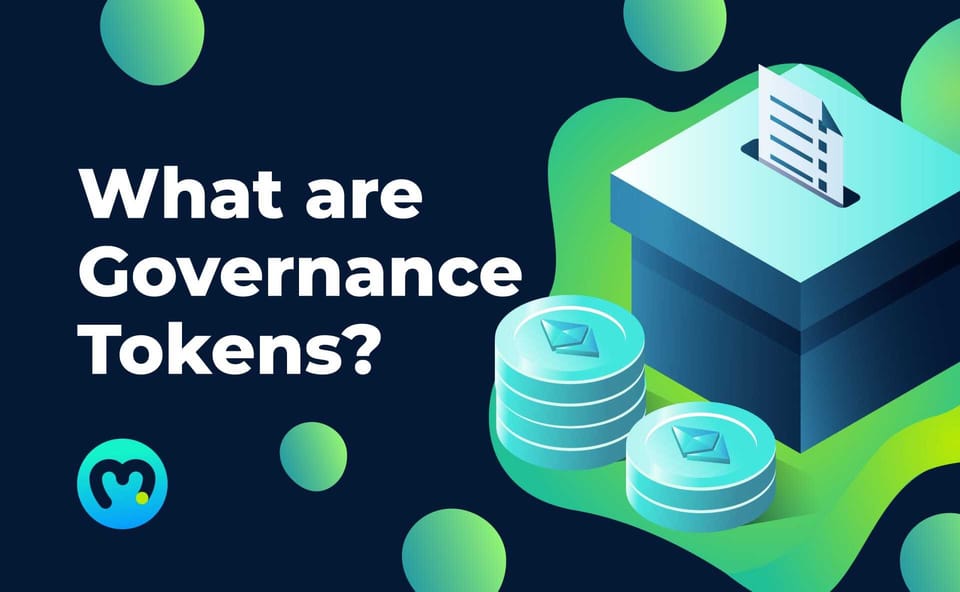Crypto Guide: What are Governance Tokens?

Governance tokens are incredibly important in the cryptocurrency industry. Unlike other types of tokens, which are used primarily for exchange or provide access to specific products or services, governance tokens assign certain rights to holders, which give them a say in the operations, direction, and maintenance of the blockchain, hence the name.
Decentralization is one of the important buzzwords driving cryptocurrency projects. One of the defining characteristics of cryptocurrencies is that they are decentralized. In decentralization, control and decision-making are transferred from a centralized entity, individual, organization, or group to a distributed network. The arrangement aims to reduce the level of trust that participants must place in one another and prevent a single entity from exerting control or authority that may compromise the functionality of the network. For example, participants can send and receive Bitcoin payments without the help or interference of a central bank or a third party.
However, some argue for a slightly different definition of decentralization, saying that it's 'a spectrum', with some being more decentralized than others. While measuring a crypto network's decentralization is difficult, we can use a few traits to assess a network's commitment to decentralization. One trick is to check if the blockchain boasts a governance token. Governance tokens are a type of cryptocurrency that allows holders to vote on the decision or direction of a blockchain project.
Unlike other crypto assets like Bitcoin, which are used as a means of payment, governance tokens incentivize participation in the decision-making process. Specifically, these crypto tokens give the holder the right to vote on specific decisions on the network, such as protocol upgrades, changes to the software code, bug fixes, or even decide on incentives for verifying or confirming blocks. In short, a holder has a say in influencing the development and direction of the network, making the project more decentralized.
There are different forms of governance models. Traditionally, the voting power of each holder is proportionate to the number of tokens he holds. Therefore, the more governance tokens you hold, the more you can influence the direction of the network. This arrangement contrasts the democratic system, where everyone has an equal vote, regardless of how many assets are owned.
Voting with governance tokens
Although different crypto projects have specific rules on governance tokens, the voting process often involves three steps:
- Acquiring your governance tokens
- Accessing the governance forum
- Staking these tokens within the smart contract or delegating them
The first step in participating in the voting and decision-making process is to buy and hold governance tokens.
Then, they must proceed to the assigned DAO platform and connect the crypto wallet. To participate in the voting process, these governance tokens must be linked within the smart contract, or another option is to delegate the right to vote.
In public blockchains, delegating means assigning a trusted individual or group within the community to vote on your behalf. This is a recommended option for holders who don't have time, resources, or enough technical skills to actively join DAO's governance. Remember, not all token holders can participate in a vote. Therefore, proposals must meet the minimum threshold of votes that must be cast before they can be discussed and settled.
A consensus mechanism is used to assess the collective opinion of the token holders and decide which changes to implement. Voting happens via a smart contract for security, fairness, and transparency. Traditionally, an on-chain governance system with a governance token follows this arrangement:
- One governance token = one vote
- A proposal passes if it gets at least a vote of 51%
- Funds from the community treasure shall be used to implement change or update
This system allows no single user or organization to have too much control over the network and its operations, thus promising improved decentralization.
Top governance tokens
As of June 25th, the governance market cap is $22.38 billion, with Uniswap (UNI) being the biggest, currently valued at $6.99 billion. In addition to Uniswap, Maker (MKR) is also one of the well-known governance tokens today.
Uniswap (UNI)
UNI is the governance token for Uniswap, an Automated Market Marker DEX operating on the Ethereum blockchain. The platform allows users to buy and trade cryptocurrencies without intermediaries and make crucial protocol changes. Voting power is distributed according to the holders' UNI balance.
Unlike other governance tokens, Uniswap requires a more complex voting mechanism. Before using your token to vote, you must pass through a delegation process. This process means binding the voting power of the tokens to an address so they can be used in the voting process. It can be a personal address or of a trusted party that you think will vote in the network's best interest. Uniswap relies on a democratic consensus, called a 'quorum,' to decide on the proposal. Under the network's rules, 1% of all UNI must cast in favor to submit a proposal and 4% to pass a vote.
To delegate your tokens and assign voting power, visit the Uniswap voting dashboard and click the "Unlock Voting" button. After clicking the button, you'll find a screen allowing you to self-delegate or add a delegate address. Choose ' Self Delegate ' if you want to delegate your voting power using your address.
Maker (MKR)
MakerDAO is a popular Ethereum blockchain protocol that aims to incentivize the community to maintain DAI, its cryptocurrency that tracks the US Dollar. The Maker Protocol has two types of tokens: DAI and MKR. The MKR holders are responsible for governing the Maker protocol, including choosing new collateral types, adjusting the policy for the DAI stablecoin, and improving overall governance.
Anyone who holds these MKR tokens can vote on specific decisions using the 'Executive Voting' process. Before the Executive Vote can happen, a 'Proposal Polling' takes place to survey the holders' sentiment on a proposal before committing to any changes to the protocol. A third type of vote can be cast by non-holders using threads in the MakerDAO forum. While anyone can submit proposals to MakerDAO, only token holders can vote.
Other use cases for governance tokens
Governance tokens are primarily used in decentralized finance (DeFi). These tokens are powerful because they give holders a platform for how a crypto project develops and operates. Also, governance tokens can boost organizational efficiency, making the entire network efficient and successful. While these tokens are primarily seen in the context of voting and decentralization, there are other use cases to enjoy.
For example, you can use these tokens for native staking on the dApp, add to the liquidity pool, and trade in the crypto market. As we all know, the crypto industry is highly volatile, and tokens can grow in value in days. A decentralized protocol can also boost the value of its governance tokens through a buy-back program. This approach reduces the number of tokens in circulation, making each token more valuable.
Whether you're interested in governance tokens for their empowering functionality or as an asset to be traded, it's always best to practice due diligence. Know your project and its token before investing time and money.

